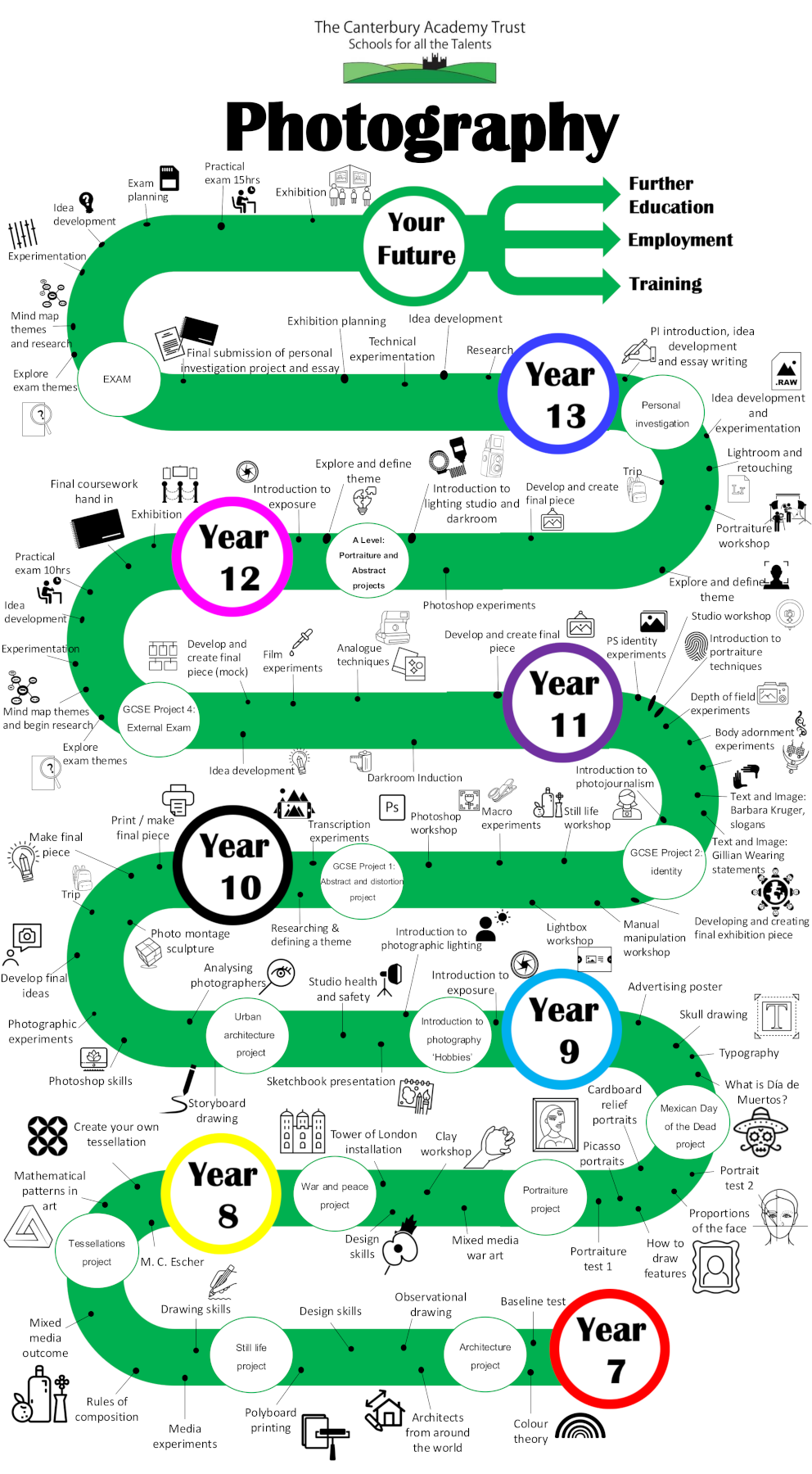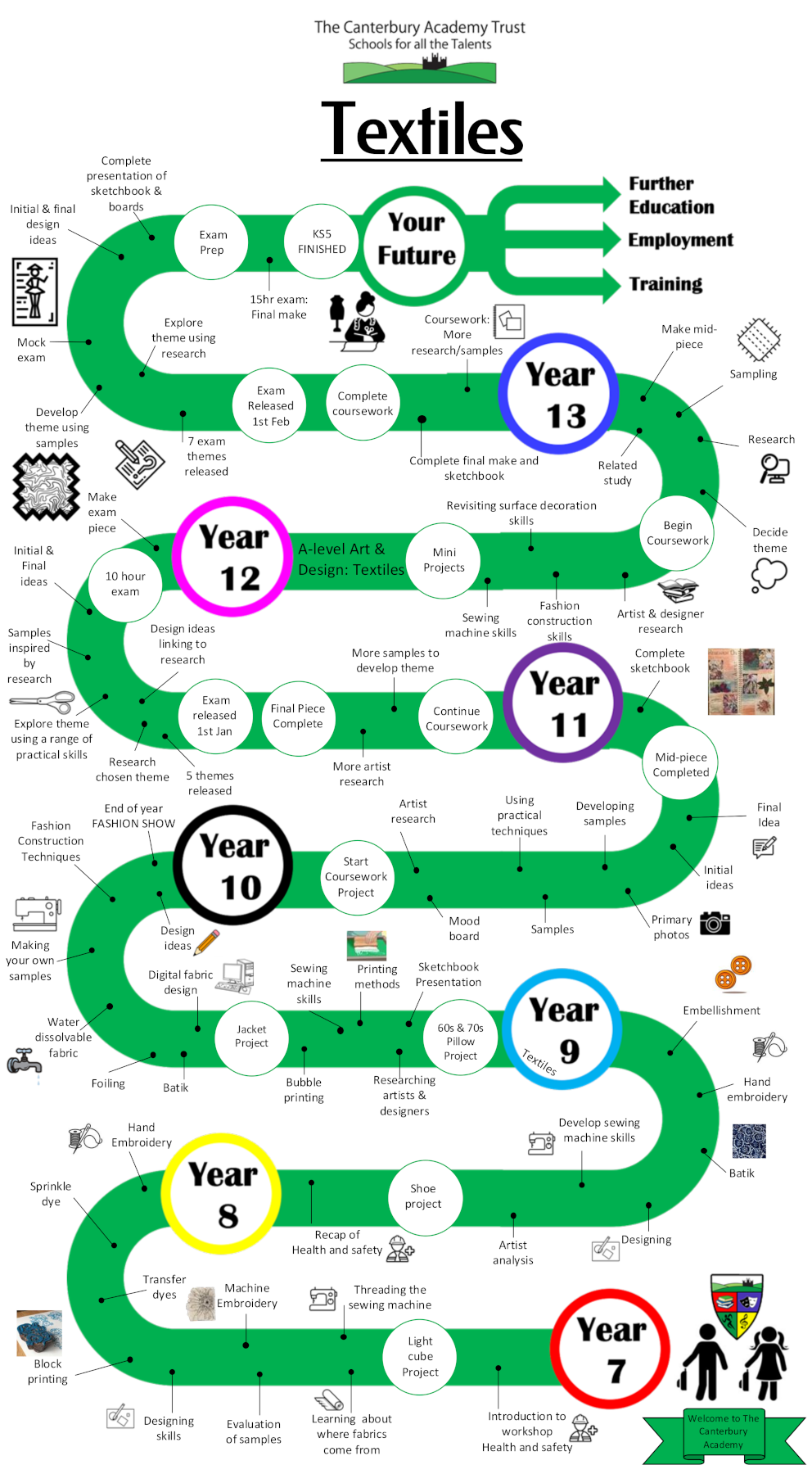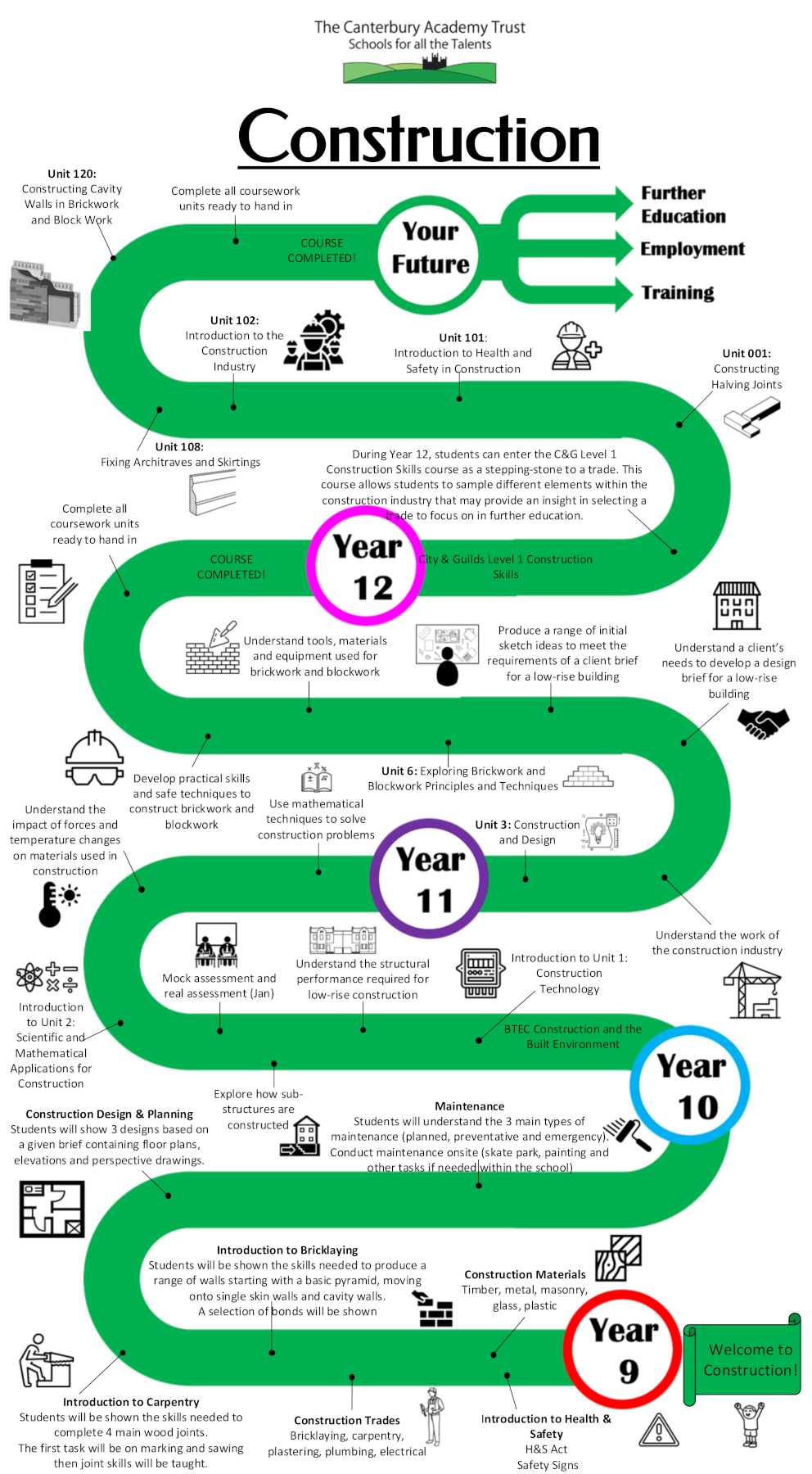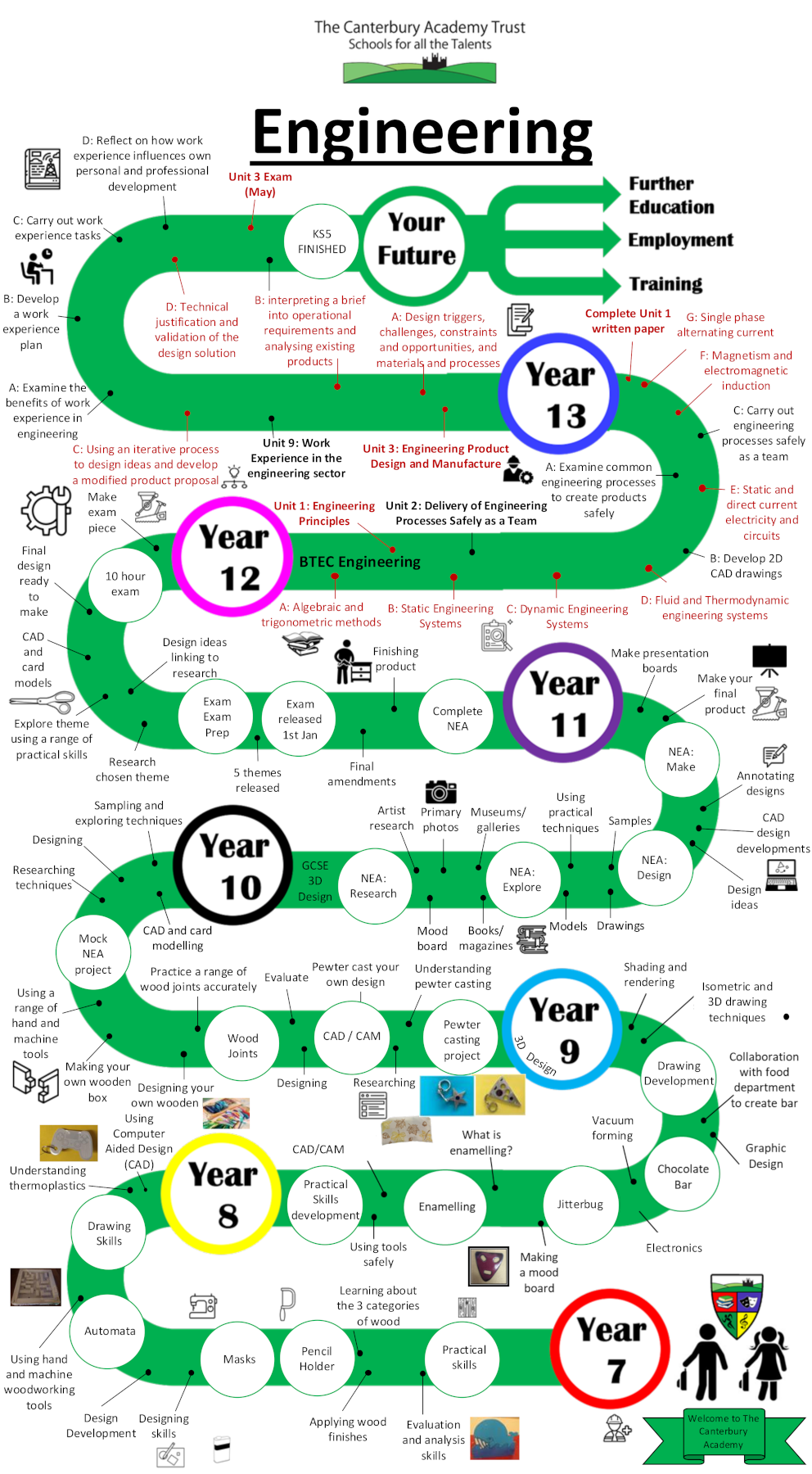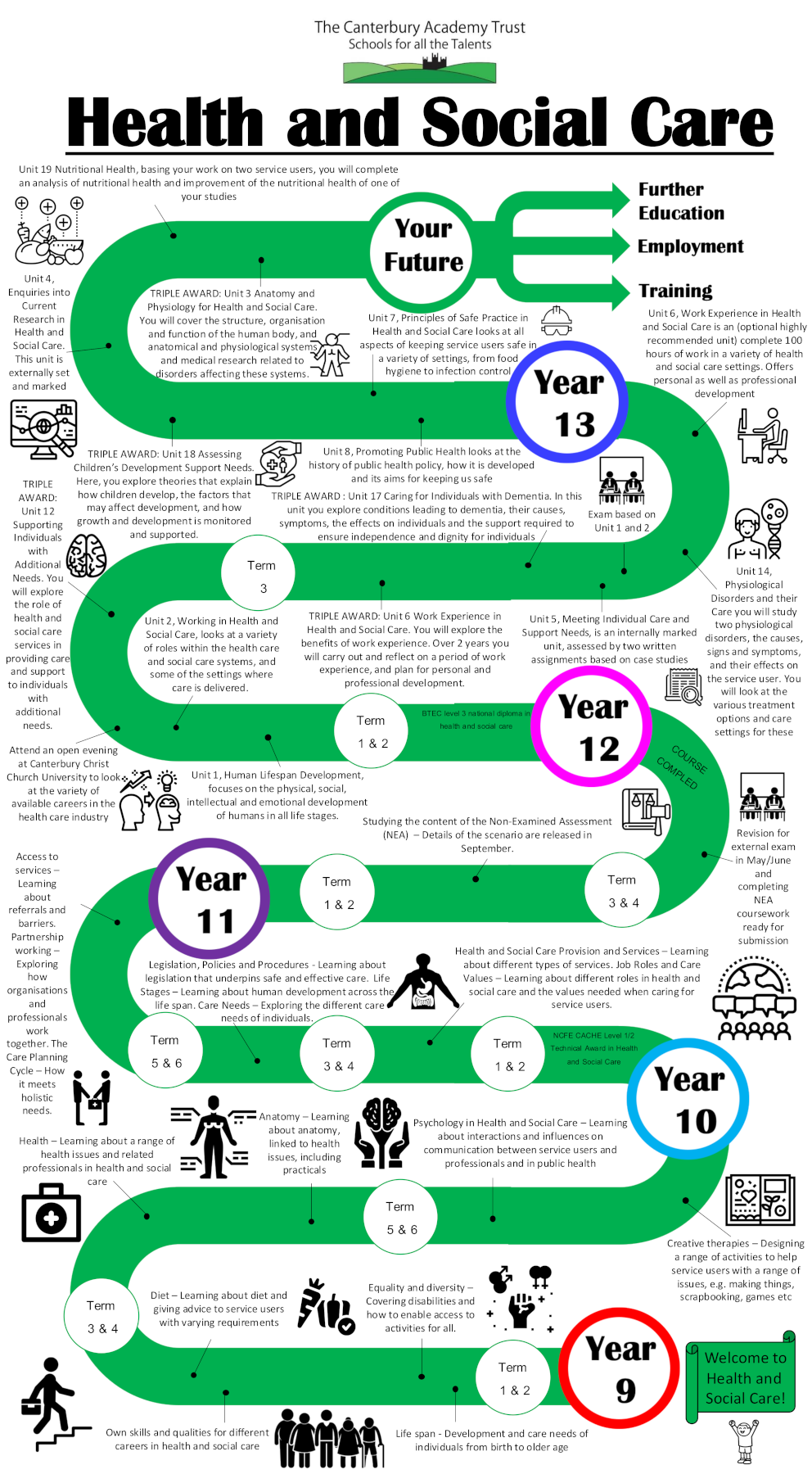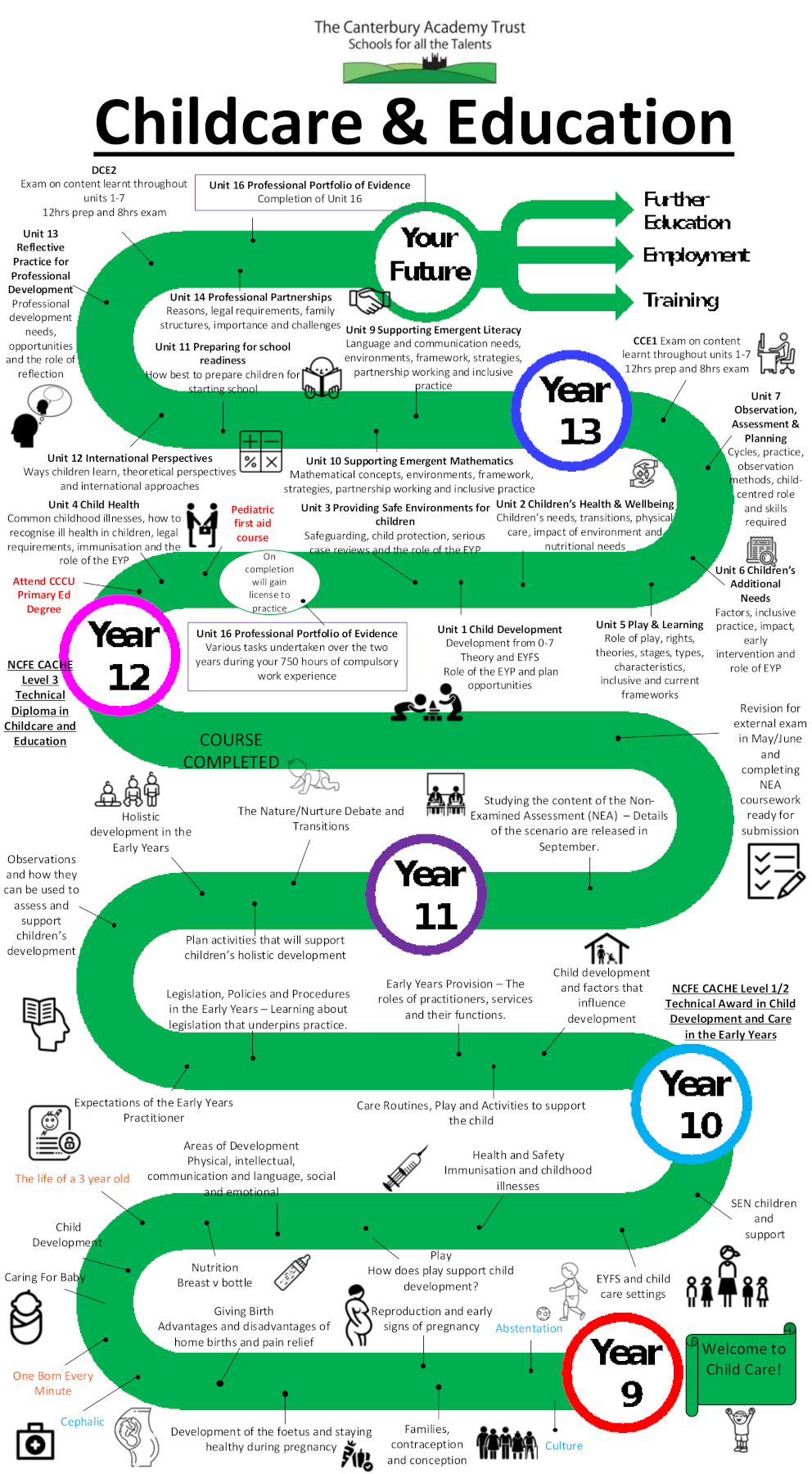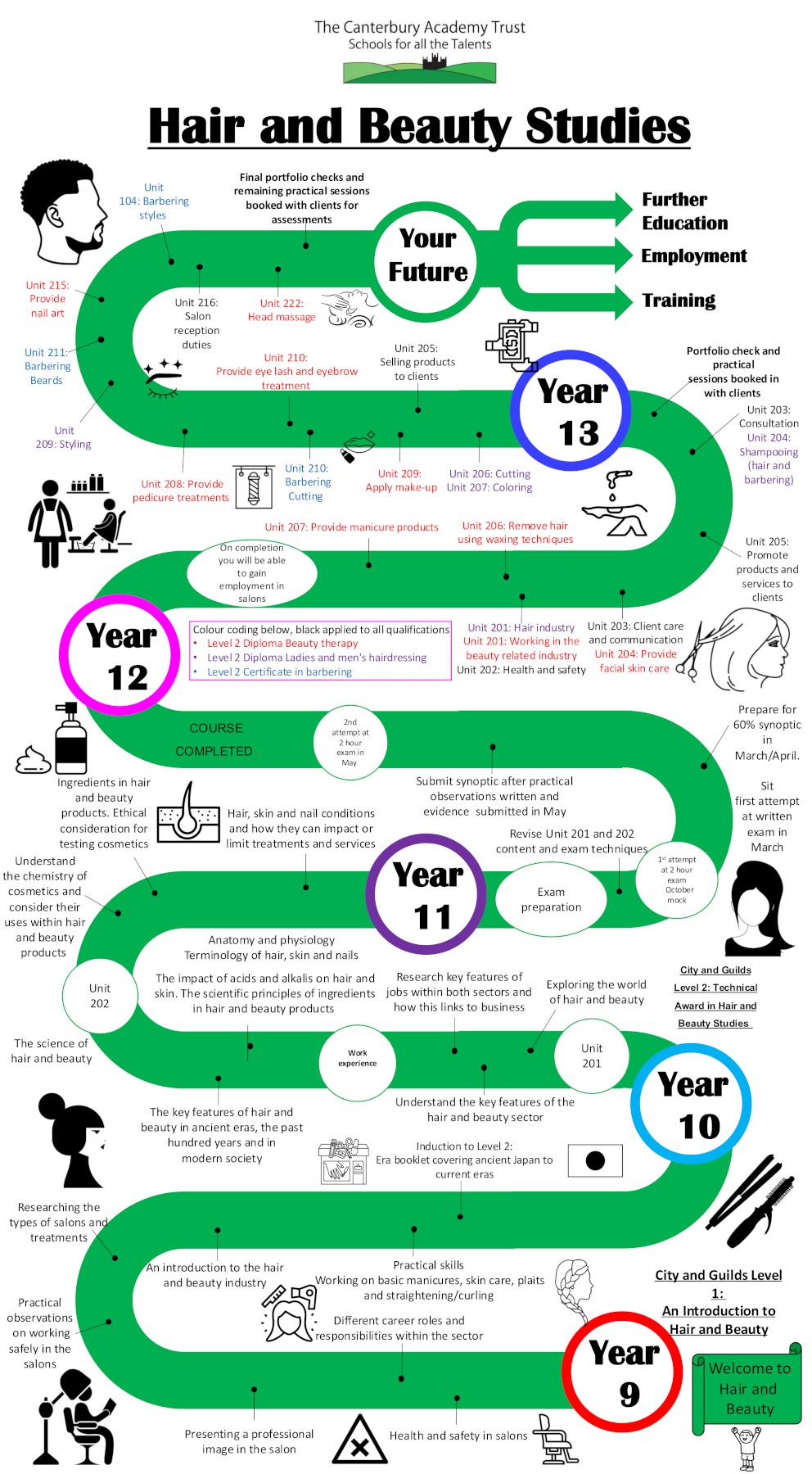Why Study Art?
At The Canterbury Academy, we believe that every child is good at something. This extends to each of their creative abilities, whether that be drawing, painting, sculpture, or imagination and ideas. Through a varied curriculum we aim to introduce students to the vast world of visual language from throughout history, and around the world. Our goal is to inspire our young people to reflect, make, create, express, refine and explore. This subject teaches young people to experiment, make mistakes and achieve. Art and Design encourages self-expression and creativity and can build confidence as well as a sense of individual identity. Creativity can also help with wellbeing and improving health and happiness. Studying Art as a subject also aids the development of critical thinking and the ability to interpret the world around us.
The purpose of studying Art at The Canterbury Academy is
Studying Art can help you develop skills like critical thinking, problem solving, and hand-eye coordination. It can also help you build confidence and emotional intelligence.
Skills:
- Critical thinking: Art can help you learn to analyse and solve problems.
- Hand-eye coordination: Art can help you improve your fine motor skills.
- Presentation skills: Art can help you learn how to arrange and display material in an aesthetically pleasing way.
- Emotional intelligence: Art can help you develop empathy and learn to accept criticism.
See our learning journey
Art Roadmap
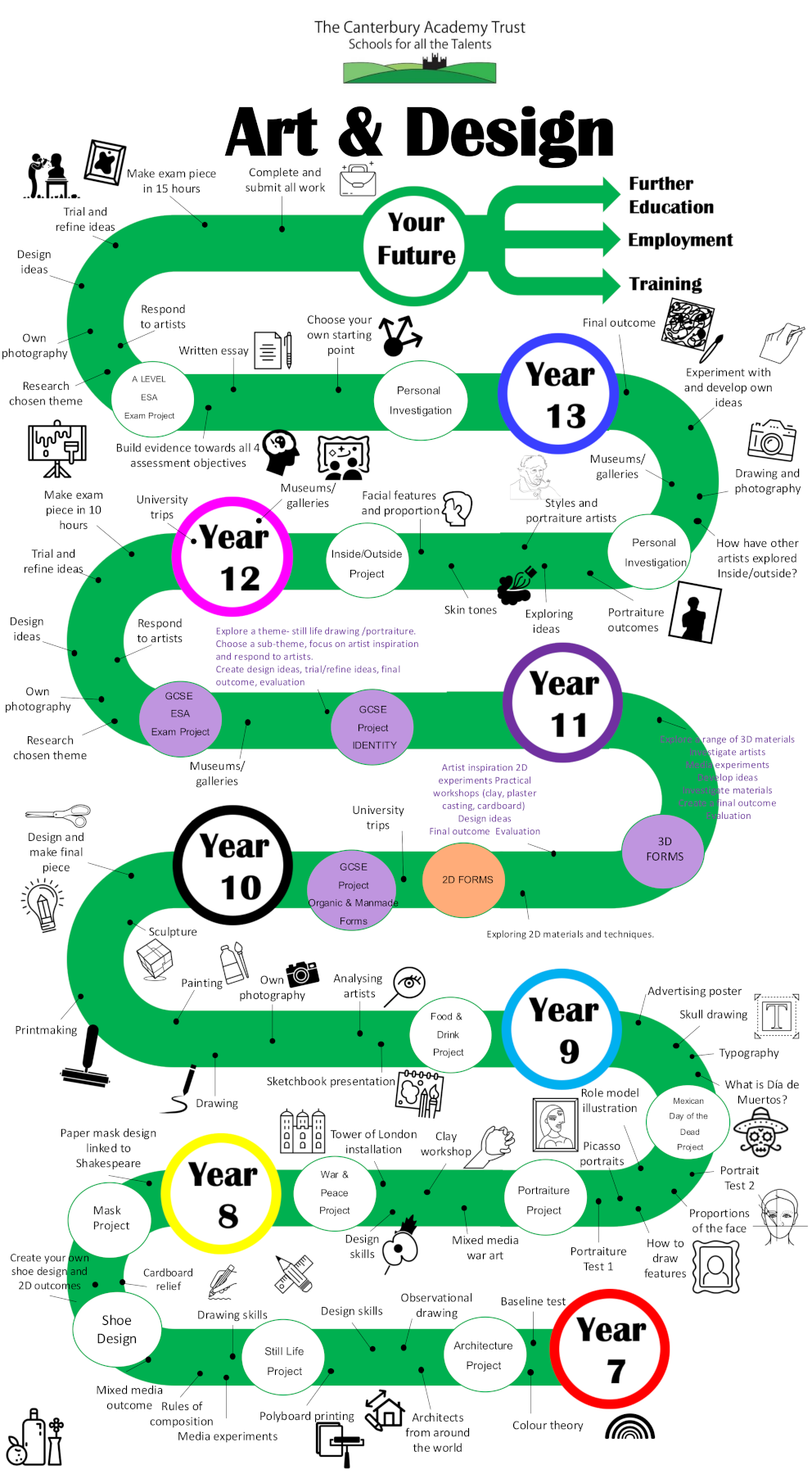
Recommended Reading
- Pinterest: www.Pinterest.com/canterburyarts
- Student Art Guide – www.studentartguide.com
- National Gallery Online: www.nationalgallery.org.uk
- Guggenheim Collection: www.guggenheim.org
- The National Portrait Gallery: www.npg.org.uk
- Access Art: www.accessart.org.uk
- Artcyclopedia: www.artcyclopedia.com
- The Design Trust: www.thedesigntrust.co.uk
- The Design Museum: www.designmuseum.org
- The Crafts Council: www.craftscouncil.org.uk
- Tate Galleries: www.tate.org.uk
- Hayward Gallery: www.southbankcentre.co.uk/venues/haywardgallery
- Museum of Modern Art: www.moma.org
- The Photographers’ Gallery: thephotographersgallery.org.uk
- Artsy: www.artsy.net
Throughout their drama education from Years 7-11, students develop a range of performance, devising, and analytical skills, progressing each year in both confidence and creativity. The curriculum builds on prior knowledge, ensuring students refine their abilities and deepen their understanding of theatre as an expressive and analytical art form.
In Year 7, students are introduced to key drama techniques, learning fundamental skills such as voice projection, movement, and characterisation. They apply these skills through engaging themes, including Matilda the Musical, which helps them explore storytelling and stage presence. Later in the year, they broaden their understanding of drama as a global art form by studying theatre traditions from different cultures, developing an appreciation for diverse performance styles.
In Year 8, students build on their foundation by exploring drama as a tool for inclusivity, focusing on The Curious Incident of the Dog in the Night-Time, which introduces them to physical theatre and perspectives on neurodiversity. They further develop their devising and design skills through Alice in Wonderland, encouraging creativity in performance and staging. The year concludes with a Murder Mystery unit, where they refine their improvisation and narrative-building abilities, preparing them for more sophisticated devising work in later years.
By Year 9, students engage with more complex dramatic techniques and theatre practitioners such as Frantic Assembly and Stanislavski, gaining insight into different acting styles and methodologies. They study DNA by Dennis Kelly, developing their ability to analyse scripts and bring characters to life through deeper emotional and physical engagement. Additionally, they refine their devising skills and learn how to critically evaluate live theatre, enhancing their ability to articulate their thoughts on performance, design, and direction. These skills lay the groundwork for the analytical and creative demands of GCSE Drama.
In Year 10, students formally begin the Edexcel GCSE Drama course, applying their accumulated knowledge to the creation of a devised performance (Component 1). Using their prior experience with improvisation, narrative-building, and acting styles, they craft original performances based on a stimulus, drawing from techniques they explored in Year 9, such as physical theatre and Stanislavski’s methods. They also deepen their understanding of theatre design elements, such as lighting, sound, and set, ensuring a well-rounded approach to their work. Alongside their practical skills, students develop their evaluative writing, which will be crucial for their final exam.
In Year 11, students refine their performance abilities and script analysis through Component 2, where they rehearse and present an extract from a published play. This builds directly on their script work from DNA in Year 9, allowing them to apply their understanding of character development and staging to a high-stakes performance. They also prepare for Component 3, the written exam, which requires them to critically analyse DNA and evaluate a live theatre performance. Their ability to assess performance elements, a skill nurtured in Year 9 through live theatre reviews, becomes essential here. Through these final assessments, students consolidate their journey, demonstrating creativity, critical thinking, and confidence in performance and analysis.
This carefully structured curriculum ensures that students continuously develop their performance abilities, creative thinking, and critical evaluation skills. By the end of Year 11, they have not only grown as performers but also as reflective and articulate individuals, equipped with the confidence and expertise to succeed in drama and beyond
Why Study Photography?
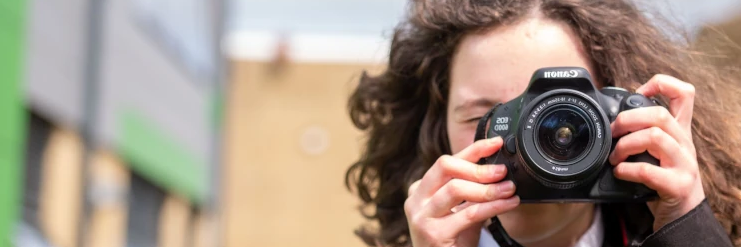
At The Canterbury Academy, we believe that every child is good at something. This extends to each of their creative abilities to communicate ideas visually through imaginative expression. Through a varied curriculum we aim to introduce students to the vast world of visual language throughout history, and around the world. Our goal is to inspire our young people to reflect, make, create, express, refine, and explore. This subject teaches young people to experiment, make mistakes and achieve. Photography and Design encourages self-expression and creativity and can build confidence as well as a sense of individual identity. Creativity can also help with wellbeing and improving health and happiness. Studying photography as a subject also aids the development of critical thinking and the ability to interpret the world around us.
The purpose of studying Photography at The Canterbury Academy is…
Studying photography can help you develop skills like critical thinking, problem solving, and technical proficiency. It can also help you build confidence and emotional intelligence.
- Critical thinking: Photography can help you learn to analyse and solve problems.
- Technical and IT skills: Photography helps with IT skills in using photo-editing software and the technical understanding of how the camera records images.
- Presentation skills: Photography can help you learn how to arrange and display visual elements in an aesthetically pleasing way.
- Emotional intelligence: Photography can help you develop empathy and learn to accept criticism.
Recommended Reading
- Guggenheim Collection: www.guggenheim.org
- The National Portrait Gallery: www.npg.org.uk
- Access Photography: www.accessart.org.uk/photography/
- The Design Trust: www.thedesigntrust.co.uk
- The Design Museum: www.designmuseum.org
- The Crafts Council: www.craftscouncil.org.uk
- Tate Galleries: www.tate.org.uk
- Hayward Gallery: www.southbankcentre.co.uk/venues/hayward-gallery/
- Museum of Modern Art: www.moma.org
- The Photographers’ Gallery: www.photonet.org.uk
See our learning journey
Photography Roadmap
Photography can be experienced in Year 7 and Year 8 Pillars classes, which offer a taster for one term of using professional cameras and exploring the making and editing of photographic images. It is important to realise that the skills gained in Art and Design such as observational drawing, composition, interpreting a theme, use of tone and colour are transferable skills that develop each student’s visual awareness. Approaching Year 9, when the Photography option becomes available, students are in a strong position to continue these skills but by applying them specifically through the medium of photography.
Key Stage 3
In Year 9, students embark on a project that explores the theme of ‘Concealment’ which establishes the cycle of project work, following this pattern of working: Developing an idea through researching and learning from existing artists and photographers: Exploring techniques and processes that experiment with ways to express this idea; Recording outcomes and observations of their work through annotation and drawing; Presenting a final outcome when a student has selected their best work and refined this to a best quality standard. Students draw upon the ideas of established photographers such as John Batho who uses camera techniques that obscure the person photographed. By learning the foundational camera techniques of shutter speed and aperture, as well as experimenting with ways of manipulating images, students quickly build their experience of creating photo-based works that personally express a concept. It is exciting to see how students make creative connections to explore an idea, for example photographing trampolining athletes to capture frozen motion with fast shutter speeds.
Key Stage 4
Taking GCSE Photography can be beneficial because it develops crucial creative and critical thinking skills, opens doors to a wide range of careers in the creative industries, allows for self-expression, enhances problem-solving abilities, and provides a platform to explore different cultures and perspectives, all while building valuable transferable skills that employers highly regard, even if you don’t pursue a career directly in photography.
In Years 10 and 11 we offer GCSE Photography (AQA exam board) which consists of Component One (Coursework projects worth 60%) and Component Two (Externally Set Assignment worth 40%). Students make use of the design cycle they experienced in Key Stage 3 of developing, exploring, recording, and presenting ideas visually from a starting point set by the teacher. A personal choice of study concludes Component One. The Externally Set Assignment commences at the start of term 3 in Year 11 in which the student selects a starting point to explore which leads towards a final outcome piece, completed in a 10-hour formal practical exam.
Key Stage 5
Photography is an exploration of practical and critical/contextual work through a range of photography-based processes and mediums. By studying A Level Photography, students have the opportunity to develop and express their creativity and ideas through a range of photographic areas and media within photography. They also have the chance to nurture more transferable skills, which are valued in a whole range of sectors.
A Level Photography (AQA) is split into two component projects which are the Personal Investigation (60%) and Externally Set Assignment (40%). Students commence the course by engaging in an initial project to introduce camera skills, digital editing, traditional chemical photography, and experimental processes. This allows students with minimal camera experience to build skills quickly and established students to refine their skill set. This prepares students to commence the Personal Investigation, a sustained project set by the student which explores an idea or concept through to a conclusion. They will respond to photographers and artists to inform their ideas. The course includes a 3000-word essay that will count towards the research element of the course. The Externally Set Assignment is a fast-moving project, distributed early in term 3 of Year 13, where a student selects a provided starting point to explore and concludes with a 15-hour practical exam to complete a final outcome of work.
Why Study Textiles?
Studying textiles allows you to be creative while using a range of textile materials and techniques. You can explore different textures and themes and also follow an area of study within textiles which inspires you.
The purpose of studying Textiles at The Canterbury Academy is…
It is designed to encourage learners to develop a wide variety of practical textile skills from sewing machines to surface decoration along with creativity and imagination. It provides an opportunity for learners to experiment and take risks with their work while developing their own style.
Recommended Reading
- The Design Museum: www.designmuseum.org
- The Crafts Council: www.craftscouncil.org.uk
- The V and A Museum: www.vam.ac.uk
See our learning journey
In Years 7 & 8, you will be introduced to a range of basic design and practical skills, which you will build upon into Year 9. You will work with a range of materials including textiles, wood, metals, and plastics.
During Year 9, you will investigate the 60’s and 70’s to inspire your pillow project, and you will learn another set of new techniques to build your independence and confidence. Lastly, you will have a final jacket project which will follow a particular theme and be showcased at the Practical Awards Evening fashion show.
Moving into GCSE, you will be able to complete a personalised project using a wider range of tools and equipment, that will contribute towards your GCSE grade. You will design and make two outcomes, which can be any of the following: fashion, accessories, art installations, interiors etc. Textiles has a practical exam which follows the same basic principles and marking criteria of the first project.
If you continue to A Level, you will gain more in-depth knowledge of how techniques can be used and can increase the complexity of your products.
By studying textiles, students will develop transferable skills including how to:
- Investigate a theme and explore the cultural, environmental, social, or historic relevance.
- Cultivate creative independence to make decisions.
- Building personal resilience to understand that not everything will work the first time; experimentation and mistakes build confidence.
Students are assessed continually through mini-projects and assessment of workbooks and final outcomes. At Key Stages 4 and 5, assessment takes place through coursework and examinations.
Why Study Food?
At The Canterbury Academy, we strongly believe that every child is good at something.
We see food as a life skill which learners will use as young adults later in life or as future parents.
The Food department wants to inspire students to be inquisitive and passionate about learning the important life skill that is cooking. We want students to become more curious and understand where their food comes from and how it is produced. The Food team will aim to provide high quality teaching in a positive and encouraging learning environment, leading to high levels of progress and achievement.
Our curriculum at each key stage develops both knowledge and practical skills for the next stage in the student’s academic journey. We aim to make students resilient and develop their problem-solving skills while reflecting on their progress when they evaluate their recipes at each end of a practical session.
The purpose of studying Food at The Canterbury Academy is…
Our aim is to deliver a high-quality food technology curriculum which engages, inspires, and challenges students, and prepares them with the knowledge, skills, and confidence to experiment with different food.
Studying Food can help you develop a range of skills: critical thinking, problem solving, and hand-eye coordination and presentation skills:
- Critical thinking: Food will help you learn to analyse and solve problems as they happen during practical lessons.
- Hand-eye coordination: Food can help you improve your fine motor skills when using knives or rolling out pastry dough perfectly.
Presentation skills: Food can help you learn how to arrange and display ingredients in an aesthetically pleasing way to enhance the appeal of the dish and bring that wow factor!
See our learning journey
Food Roadmap
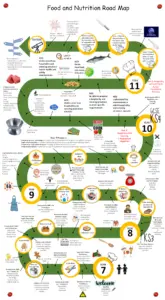
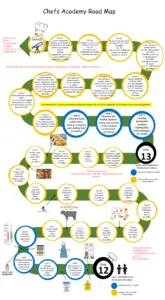
Key Stage 3
All students in Years 7 and 8 follow Food studies with 2 lessons a fortnight. Students will focus on different topics each term to develop their understanding of food safety, nutrition and gain a range of practical skills. Throughout the course the students will build up their cooking skills and learn to become more independent.
Students will have regular assessment to check progress and understanding.
At Year 9 students will have the opportunity to choose food as an option and will have 3 lessons a fortnight. Students will build upon the skills and knowledge acquired in Year 7 and 8 and decide at the end of the year if they wish to take this subject as one of their GCSE options. This course focuses on deepening their skills with more complex recipes as well as the functions of ingredient in recipes (aeration, gelatinisation, coagulation).
Key Stage 4
At Year 10 and 11 students follow the AQA GCSE in Food Preparation & Nutrition.
This GCSE Food Preparation and Nutrition is an exciting and creative course which focuses on practical cooking skills to ensure students develop a thorough understanding of nutrition, food provenance and the working characteristics of food materials. At its heart, this qualification focuses on nurturing students’ practical cookery skills to give them a strong understanding of nutrition.
Food preparation skills are integrated into five core topics:
- Food, nutrition and health
- Food science
- Food safety
- Food choice
- Food provenance
Courses based on this specification should enable students to:
- Demonstrate effective and safe cooking skills by planning, preparing, and cooking using a variety of food commodities, cooking techniques and equipment.
- Develop knowledge and understanding of the functional properties and chemical processes as well as the nutritional content of food and drinks.
- Understand the relationship between diet, nutrition and health, including the physiological and psychological effects of poor diet and health.
- Understand the economic, environmental, ethical, and socio-cultural influences on food availability, production processes, and diet and health choices.
- Demonstrate knowledge and understanding of functional and nutritional properties, sensory qualities and microbiological food safety considerations when preparing, processing, storing, cooking and serving food.
- Understand and explore a range of ingredients and processes from different culinary traditions (traditional British and international), to inspire new ideas or modify existing recipes.
Key Stage 5
Students willing to further enhance their culinary skills and take this as a profession can join the Chef’s Academy. Students will follow an NVQ Diploma in Professional Cookery. Level 2 and Level 3 qualification (only school in Canterbury to offer Level 3).
Year 12: 4 Mandatory units (13 credits) and optional 14 units (60 credits) teacher’s choice.
Year 13: Mandatory units (17 credits) and optional units (39 credits) student choices.
Students alternate learning phases at the Academy and in a professional setting to further develop their skills and experience a wide range of hospitality and catering outlets.
In the school setting students will visit factories, food shows, markets, and restaurants. During school events students take part in preparing finger buffet type menus or table service menus. Event planned: St George’s Day, Burns Night (haggis), Halloween.
Why Study Construction?
Studying Construction provides you with knowledge and skills which can lead you to a range of trades, from a builder to plumber, electrician, or joiner. The knowledge of techniques also makes a great foundation for many other trades and valuable life skills.
The purpose of studying Contruction at The Canterbury Academy is…
The purpose of studying Construction at The Canterbury Academy is to develop a range of skills which can support you in many practical trades. You will learn about the design and structure of buildings, materials and techniques and gain an understanding of a range of trades so that you feel confident in your future choices.
Recommended Reading
See our learning journey
Key Stage 3
At Key Stage 3, you will be introduced to a range of basic design and practical skills through design and technology lessons, which you will build upon into Key Stage 4. You will work with a range of materials including textiles, wood, metals, and plastics.
Students are assessed continually through mini-projects and assessment of workbooks and final outcomes. At Key Stages 4 and 5, assessment takes place through coursework and examinations. .
Key Stage 4 and 5
Moving into Key Stage 4, you will be able to work to briefs to design and make products using a range of skills based on either joinery, bricklaying, electrics, or plumbing.
Students are assessed continually through mini-projects and assessment of workbooks and final outcomes. At Key Stages 4 and 5, assessment takes place through coursework and examinations.
Why Study Design and Technology?
Every product you use has been designed by someone. Who designed the chair you are sitting on? Or the phone you use? Who designed the buildings you are in? Designers have a very important role in making our day-to-day lives comfortable and tasks more efficient. Designers also play a part in understanding and selecting materials for these products, and how these impact the world we live in. Could you be a future designer?
The purpose of studying Design and Technology at The Canterbury Academy is…
The purpose of studying Product Design or 3-Dimensional Design at The Canterbury Academy is to develop a range of skills which help you to understand how things work, how they are made and who they are made for. You will acquire the following skills:
- Practical skills using a range of materials, tools, and equipment.
- Theoretical knowledge.
- Knowledge of historical, social, cultural, environmental, and economic influences on design and technology.
- Produce prototypes of your choice.
- A real understanding of what it means to be a designer.
- Knowledge and skills sought by higher education and employers.
- Development of creativity and ideas.
Recommended Reading
See our learning journey
Design and Technology Roadmap
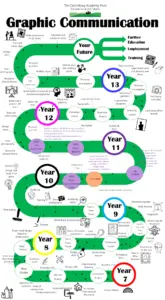
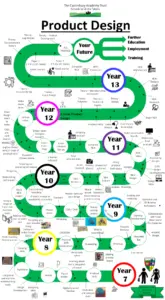
Key Stage 3
At Key Stage 3, you will be introduced to a range of basic design and practical skills through design and technology lessons, which you will build upon into Key Stage 4. You will work with a range of materials including textiles, wood, metals, and plastics.
Students are assessed continually through mini-projects and assessment of workbooks and final outcomes.
Key Stage 4 and 5
In Key Stage 4, you will be able to complete more complex projects using a wider range of tools and equipment and have more freedom of the products you make. You will design them yourself and produce prototypes. If you continue to A Level, you will gain more in-depth knowledge of how design has been influenced by socio-economic factors as well as a deep knowledge of materials and technologies.
Students are assessed continually through mini-projects and assessment of workbooks and final outcomes. At Key Stages 4 and 5, assessment takes place through coursework and examinations.
Why Study Engineering?
Have you ever thought about how things work? Or how technology has developed rapidly and changed the way we live our modern lives? Engineers use a combination of science, maths and technology to solve problems and build products.
The purpose of studying Engineering at The Canterbury Academy is…
The purpose of studying Engineering at The Canterbury Academy is to develop a range of skills which help you to understand how things work, and how they are made.
This qualification provides a broad basis of study for the engineering sector. It has been designed to support progression to higher education when taken as part of a programme of study that includes other appropriate BTEC Nationals or A Levels
Recommended Reading
See our learning journey
At Key Stage 3, you will be introduced to a range of basic design and practical skills, which you will build upon in Key Stage 4. You will work with a range of materials including textiles, woods, metals and plastics.
Moving into Key Stage 4, you will be able to complete more complex projects using a wider range of tools and equipment and have more freedom in the products you make. You will design them yourself and produce prototypes. If you continue on to A Level, you will gain more in-depth knowledge of how design has been influenced by socioeconomic factors as well as a deep knowledge of materials and technologies.
Students are assessed continually through mini-projects and assessment of workbooks and final outcomes. At Key Stages 4 and 5, assessment takes place through coursework and examinations.
Why Study Health and Social Care?
Health and Social Care is one of the largest and most rewarding sectors in the UK and abroad. There are 350 job roles within the NHS alone. From birth until late adulthood, everyone requires support at some point, and their varying needs should be met with compassionate care.
The purpose of studying Health and Social Care at The Canterbury Academy is…
Health and Social care enables students to gain knowledge and understanding of the range of services and health professionals from dental nurses, paramedics, physiotherapists, mental health nursing to social workers, community health nurse, and youth workers and more.
There are many transferable skills in Health and Social Care including:
- decision making
- observation
- resourcefulness
- problem solving
- planning
- evaluation
- reflection
- interpersonal skills
- professional behaviours
- respect and appreciation of others
- an ability to reflect upon their preferred learning style and identify relevant study skills.
Recommended Reading
- NCFE CACHE Level 2 Technical Award in Health and Social Care – Judith Adams (Author)
- BTEC National Health and Social Care Student Book 1 by Marilyn Billingham
- BTEC National Health and Social Care Student Book 2: For the 2016 specifications (BTEC Nationals Health and Social Care 2016) Paperback – 1 Nov. 2016 by Carolyn Aldworth (Author), Nicola Matthews (Author), Sue Hocking (Author),
See our learning journey
Health and Social Care Roadmap
Key Stage 3
Year 9 Health and Social Care includes learning about the different health and social care provision and services and the care values that underpin professional practice and job roles. Students learn about the 6 C’s: care, compassion, courage, communication, confidentiality, and commitment. They learn what they are and why they are so important in delivering effective care in health and social care. Learners will be able to understand human lifespan across six stages of life. Students will be given termly assessments and given opportunities to feedback on these assessments. Grades are set to comply with the rest of KS3, which are Emerging, Developing, Secured, and Mastered.
Key Stage 4
From Year 10 the Level 1/2 Technical Award in Health and Social Care complements GCSE qualifications. It is aimed at 14 to 16 year olds studying KS4.
The qualification is graded at Level 1 pass/merit/distinction and Level 2 pass/merit/distinction/distinction* (equivalent to GCSE grades 8.5 to 1).
In Year 10 students learn about legislation, policies and procedures in health and social care. Students will learn individual care needs and understand how these are met through working in partnership with other professionals and implementation of care values.
In terms 5 and 6 students will learn how health and social care services are accessed, and the function of regulatory bodies. Students will complete content area assessments and be given termly feedback.
In Year 11 students will learn about partnership working in health and social care and the care planning cycle.
- Non-exam assessment (NEA) 13 hours; this assessment is worth 50% of the qualification. Students are provided with a project brief/case study to create notes on before they sit a series of 5 tasks over 13 hours of lesson time. The students will start to prepare for this assessment in terms 2 or 3 and sit these tasks in terms 3 or 4. This NEA assessment is marked internally by the teachers.
- Examined assessment (EA) 1 hour 30 minutes. This exam is worth 50% of the overall qualification; it is marked externally by the exam board. The students will prepare for this exam by completing a mock exam in term 2.
Key Stage 5
Students will be enrolled on BTEC Level 3 Nationals in Health and Social Care. We offer the Diploma (equivalent to 2 A Levels) and Extended Diploma (equivalent to 3 A Levels).
Why Study Childcare and Development?
Whether you are a natural nurturer, caring, fun and friendly person, childcare and development will build on these skills to create a well-informed and effective childcare practitioner.
The purpose of studying Childcare and Development at The Canterbury Academy is…
The Government recognise the need for more high-quality childcare and have recently been taking steps to ensure there will be more childcare available for families in the UK. The need for more childcare means there is a short fall in childcare places and Level 2 and Level 3 practitioners. There are already now and will be in the future many employment opportunities in this industry.
At The Canterbury Academy we have taught and supported many Level 2 and 3 childcare practitioners who now successfully work in the industry; some continue to work at the The Canterbury Academy’s Nursery, City View. These practitioners advocate the need for more childcare workers and have expressed how working in this industry means you are never bored as every day is different and the most rewarding job you can find. Making a difference to babies, children and families lives every day can be exciting and provide a real sense of achievement.
Recommended Reading
- NCFE CACHE Level 1/2 Technical Award in Child Development and Care in the Early Years Second Edition Paperback – 25 Nov. 2022 by Louise Burnham (Author), Penny Tassoni (Author)
See our learning journey
The Childcare and Development Roadmap
Key Stage 3
In Year 9, students will learn about families, contraception and conception, reproduction and early signs of pregnancy, advantages and disadvantages of home births, and pain relief. Moving on to child development, including development milestones, students will understand factors that influence the child’s development and care routines including nutrition and breast v bottle feeding. Lastly, the areas of development: physical, cognitive, communication and language, social and emotional. Students will be given termly assessments and given opportunities to feedback on these assessments. Grades are set to comply with the rest of KS3, which are Emerging, Developing, Secured, and Mastered.
Key Stage 4
In Year 10 students will learn the different types of early years provision, legislation, policies, and procedures. Expectations of the early years’ practitioner and roles and responsibilities within early years settings will also be learnt.
Year 10 Level 1/2 Technical Award in Childcare and Development complements GCSE qualification.
The qualification is graded at Level 1 pass/merit/distinction and Level 2 pass/merit/distinction/distinction* (equivalent to GCSE grades 8.5 to 1).
In Year 11 students will learn the importance of observations and planning in early years childcare.
This qualification is assessed by two forms of assessments:
- Non-exam assessment (NEA) 14 hours, this assessment is worth 50% of the qualification. Students are provided with a project brief/case study to create notes on before they sit a series of 6 tasks over 14 hours of lesson time. The students will start to prepare for this assessment in terms 2 or 3 and sit these tasks in terms 3 or 4. This NEA assessment is marked internally by the teachers.
- Examined assessment (EA) 1 hour 30 minutes. This exam is worth 50% of the overall qualification; it is marked externally by the exam board. The students will prepare for this exam by completing a mock exam in term 2.
Key Stage 5
Students will be enrolled on:
NCFE CACHE Level 3 Award in Childcare and Education (2 units no exam).
NCFE CACHE Level 3 Certificate in Childcare and Education (7 units, 1 exam and 350 hours placement, equivalent to 1 A Level).
NCFE CACHE Level 3 Diploma in Childcare and Education (16 units, 2 exams and 750 hours placement, equivalent to 3 A Levels).
Why Study Hair and Beauty?
At The Canterbury Academy, we are incredibly lucky to offer our students an introduction to the world of hair and beauty. In this subject area, which is an ever-growing industry, students will be able to express themselves during practical tasks. Equally, they will reflect on their own progression as hair and beauty develop dexterity skills, hand and eye coordination and gives the students an insight into the realistic world of the industry.
Hair and Beauty gives students the encouragement to be creative, express their own artistic abilities, and equally have fun whilst learning.
The purpose of studying Hair and Beauty at The Canterbury Academy is…
Studying Hair and Beauty can help develop skills such as dexterity skills, hand and eye coordination, independent thinking, and creativity.
Skills
- Dexterity: enabling students to work with both hands during practical tasks.
- Hand and eye coordination helps students use their fine motor skills, checking balance and evenness of their practical work.
- Creativity: to express their own creative skills from taught knowledge.
- Independent thinking: analysing and reflecting on their own work.
Recommended Reading
- The City & Guilds Textbook: Entry 3/Level 1 VRQ in Hairdressing and Beauty Therapy
- Level 2 VRQ level 2 in Hairdressing and Level 2 VRQ in Beauty therapy
See our learning journey
The Hair and Beauty Roadmap
Key Stage 3
In Years 7 and 8 we offer what we call Pillars; this is where students can pick Hair and Beauty as a subject which lasts for two terms. During this time students get to learn the fundamentals in the industry, which includes plaiting, straightening, and curling hair. In beauty they have the chance to learn how to apply nail polish, and nail art.
When students reach Year 9, they have the chance to study Hair and Beauty, which is called a preference. During this year students have the opportunity to learn practical skills within the hair and beauty industry alongside theoretical knowledge about the world of hair and beauty. Within the practical lessons students learn how to shampoo, blow-dry, and style hair, and in beauty carry out a full manicure, facials and make-up. This helps the students to develop their dexterity and hand and eye coordination skills. Students learn the anatomy and physiology behind hair, skin, and nails. The salon is equipped as a working salon to give students a realistic world of working in a hair and beauty salon.
Key Stage 4
In Year 10 we offer students a technical award Level 2 Hair and Beauty (GCSE). This starts in Year 10 and is seen through to Year 11. Within the GCSE, students explore three different units, which are 201 exploring the world of the hair and beauty sector, 202 the science behind the hair and beauty sector, and lastly 203 designs within the hair and beauty sector. These three units are taught throughout Year 10 with tasks and assessments set in both theory and practical.
In Year 11 students receive their synoptic assignments which make up 60% of their GCSE grade, this is the focus in Year 11. The synoptic assignment is set by the awarding body City and Guilds, and they will be given an Era, to research and focus on the detail given in the assignment brief to the students.
The Synoptic assignment (coursework) is assessed and graded by three different tasks; Task 1 is a written piece of work which is researched first. Task 2 students will carry out practical tasks, where they will recreate hair, make up and nails on a person, reflecting the Era, which has been selected from the awarding body. Task 3 is a design task where students will be asked to design a promotional material reflecting the event in the synoptic assignment brief, the three tasks together give students a grade which makes up 60% of their final grade.
The final 40% of their grade is a written exam and this is externally marked by the awarding body. The written exam is sat in the summer, along with all the other GCSE exams, the Exam will have a range of questions which will reflect on what students learnt in Year 10.
Key Stage 5
We offer separate courses in Sixth Form, which gives students more flexibility to choose their own career options. Students can choose from the following:
- VRQ a Diploma in women’s and men’s hairdressing/women’s hairdressing.
- Certificate in Barbering
- VRQ in beauty therapy
All these courses are progression into the industry, to help support students grow into the sector, students, will be practicing and working on real clients.
In Hairdressing, students will learn how to shampoo, cut women’s and men’s hair, colouring and lighten hair, blow drying and styling. Students will practice then when ready for assessment will be assessed on clients. Each unit has an online multiple-choice test which they must sit, and pass.
Barbering, students will learn to cut men’s hair and beard trim, shampoo. Each unit has an online multiple-choice test which they must sit and pass.
In Beauty, students will practice and learn how to do waxing, manicure, pedicures, facials, eye lash and brow treatments, each unit will have a multiple-choice online test which students must sit and pass.
Meet the Practical Learning Department
| Mrs N Bonneywell | Practical Faculty Leader |
| Mrs. Player | Head of Art |
| Mrs L Winslow | Teacher of Art and Graphic Design |
| Mr P Weichselbaum-Barlow | Head of Photography |
| Miss A Curtis | Teacher of Art and Photography |
| Ms D Shulze | Teacher of Art and Photography |
| Ms. Madeline | Teacher of Art and Photography |
| Mrs V Scollon | Head of Design, Technology, Construction and Engineering |
| Mrs E Carter | Teacher of Textiles |
| Ms J Woolley | Teacher of Textiles |
| Mrs R. Jenkins-French | Teacher of Design, Technology and Engineering |
| Mr D Wall | Teacher of Design, Technology and Construction |
| Mr N Sutcliffe | Teacher of Design, Technology and Construction |
| Mr R. Canavan | Design and Technology Technician |
| Mr A Pennec | Head of Food |
| Mrs S Jordan | Teacher of Food |
| Mrs J Welfare | Teacher of Food |
| Mrs A Rogowska | Teacher of Food |
| Mrs Shilling | Food technician |
| Mrs V Holman | Teacher of Child Studies – Assistant Head |
| Mrs H Wiles | Teacher of Health and Child Studies |
| Miss S Oasgood-White | Teacher of Health and Child Studies |
| Ms E Mills | Head of Department for Hair and Beauty |
| Ms A Ostle | Teacher of Beauty |
Courses offered at KS4 and KS5
Key Stage 4
- GCSE Fine Art – AQA
- GCSE Photography – AQA
- GCSE Art and Design: Textiles – OCR
- GCSE Art and Design: 3D Design – OCR
- GCSE Food Preparation and Nutrition – AQA
- BTEC Level 1/2 Construction and the Built Environment
- BTEC Level 1/2 Technical Award in Health and Social Care
- BTEC Level 1/2 Technical Award in Childcare and Development
- Gity and Guilds Entry 3/Level 1 VRQ in Hairdressing and Beauty Therapy
Key Stage 5
- A Level Fine Art – AQA
- A Level Photography – AQA
- A Level Art and Design: Textiles – OCR
- A Level Art and Design: 3D Design – OCR
- NVQ Diploma in Professional Cookery- Level 2 and Level 3
- NCFE CACHE Level 3 Award in Childcare and Education
- NCFE CACHE Level 3 Certificate in Childcare and Education
- NCFE CACHE Level 3 Diploma in Childcare and Education
- BTEC Level 1/2 Construction and the Built Environment
- BTEC Level 3 Extended Certificate in Engineering
- BTEC Level 3 Nationals in Health and Social Care
- VRQ Level 2 Hairdressing
- VQR Level 2 Beauty therapy


